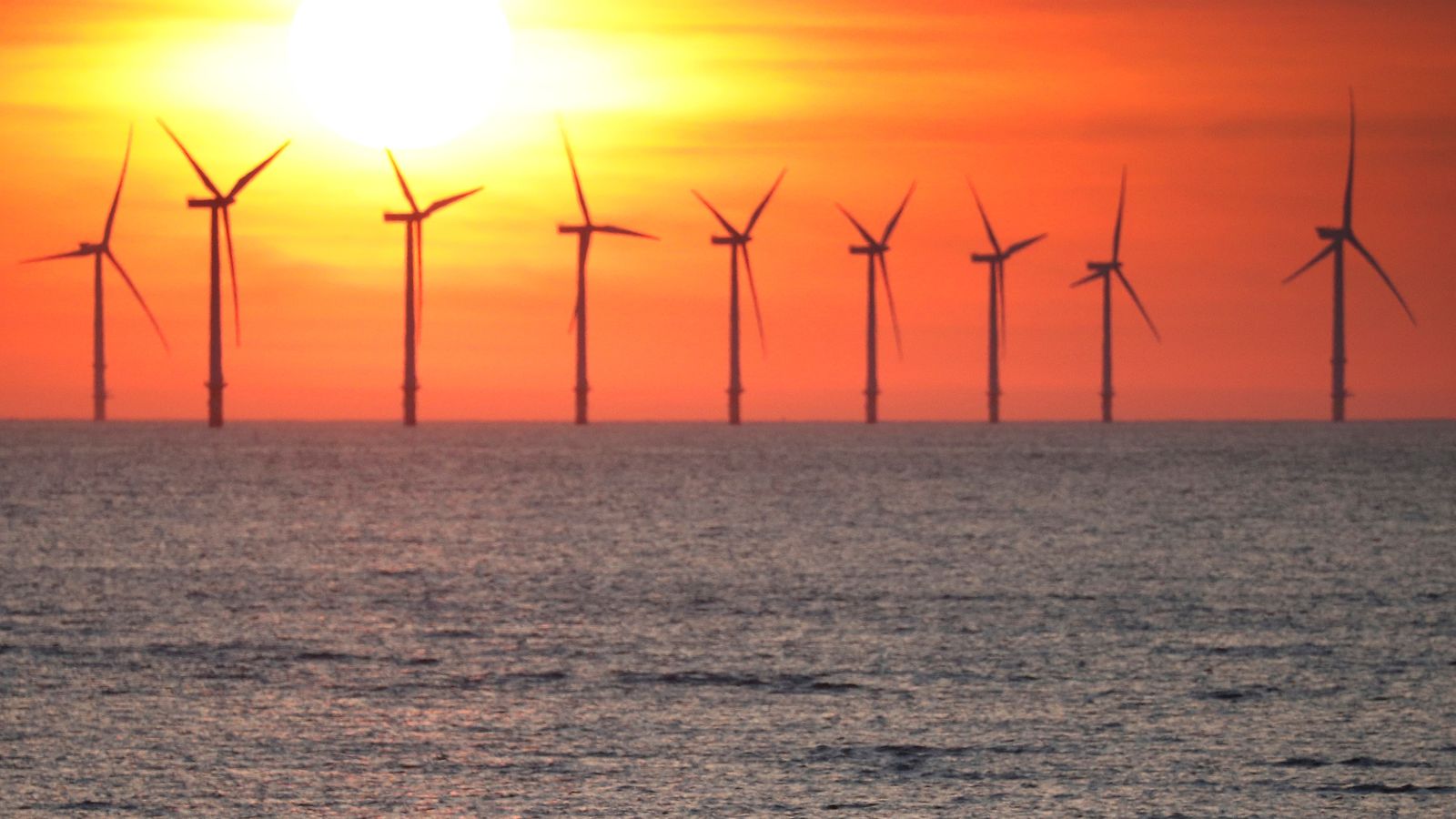Goal to decarbonise power system by 2035 ‘jeopardised by lack of plan’
The Public Accounts Committee said the government has a challenging ambition to decarbonise the power sector by 2035 – but no overarching delivery plan exists to reach that goal.
Faye Brown
Political reporter @fayebrownSky
Wednesday 21 June 2023 00:46, UK
Listen to this article
0:00 / 3:35
1X
BeyondWords
Audio created using AI assistance
A man stands on the beach as the sun sets behind the Burbo Bank wind farm near New Brighton, Britain, May 22, 2018. REUTERS/Phil Noble
Why you can trust Sky News
The government lacks a coherent strategy to meet its “landmark commitment” to decarbonise the power system within the next 12 years, according to an influential group of cross party MPs.
The Public Accounts Committee (PAC) said it is sceptical that expansion plans for nuclear, solar and wind are credible, and unconvinced the private sector has enough clarity to provide investment.
Former Prime Minister Boris Johnson promised to make UK electricity generation fossil fuel free by 2035 as part of a drive for net zero emissions.
The government called it a “landmark” pledge and said the move would protect households from exposure to volatile global wholesale energy prices – which have rocketed since the war in Ukraine.
However, a PAC report published today said while ministers have many separate ongoing power decarbonisation plans, its ambitions are jeopardised by the lack of an integrated and coherent delivery strategy.
Dame Meg Hillier MP, Chair of the Committee, said there was an “information vacuum” in several key areas, including what cost the transition will have on the public.
She said: “What is the plan? It has now long been understood and accepted that greening our economy is an existential priority, with the government setting itself the target of securing an entirely low-carbon power supply by 2035.
MORE ON CLIMATE CHANGE
Team members of ETH (Swiss Federal Institute of Technology) glaciologist and head of the Swiss measurement network 'Glamos'
Swiss voters back ambitious plans to save melting glaciers in referendum
Horse Hill oil site
New oil and gas extraction in UK threatened by legal challenges
Garden hose
Millions to be hit by hosepipe ban
Related Topics:
Climate Change
“But without a coherent delivery plan to get there, the government will find it harder to know what decisions it must take, and when, to ensure that it can realistically reach its ambitions.”
The inquiry heard that the government’s focus on providing energy bill support to manage high gas prices distracted it from longer-term activities on decarbonisation.
Ms Hillier admitted that since the pledge was made in October 2021, “we wouldn’t have expected to see huge progression”.
File photo dated 6/10/2020 of Teesside Wind Farm near the mouth of the River Tees off the North Yorkshire coast. 24:07
Play Video – UK’s net zero climate plan
What is the UK’s net zero climate plan?
However, she said energy generated by wind, nuclear and solar power is at a quarter of where it needs to be and the build up to a fully decarbonised system is a “big task requiring hundreds of billions of investment”.
“There needs to be a plan on how you spend that money and how you deliver the infrastructure required to deliver this,” she told Sky News.
“We have to make sure we are taking into account the needs and the costs to the consumer.”
Click to subscribe to ClimateCast with Tom Heap wherever you get your podcasts
Ministers estimate that up to £400 billion of public and private investment in new generating capacity will be needed by 2037 to decarbonise the power system.
In his Spring Budget, Chancellor Jeremy Hunt announced £20bn of funding into new carbon capture technology to help achieve the government’s aims – but climate campaigners called the drive a “gamble” and criticised the lack of giveaways for the solar or wind industries.
Read More: ‘Alarming lack of credibility’ in net zero climate promises
In a series of recommendations, The PAC said the government should pull together its various plans for decarbonsing the system into one report by autumn 2023 at the latest.
The delivery plan should provide greater clarity to the private sector to encourage the required investment, and also contain information on when and how the costs of decarbonisation will impact bill payers, the committee said.
Questions also need to be answered on how decarbonisation will promote energy efficiency, with recent bill support schemes focused on reducing cost rather than demand, the report added.
Related Topics
Climate Change



























![Qatar Labor Law In 2020??? [UPDATES]](https://welcomeqatar.com/wp-content/uploads/2020/12/Qatar-Labor-Law-1-696x366-1-324x366.jpg)

